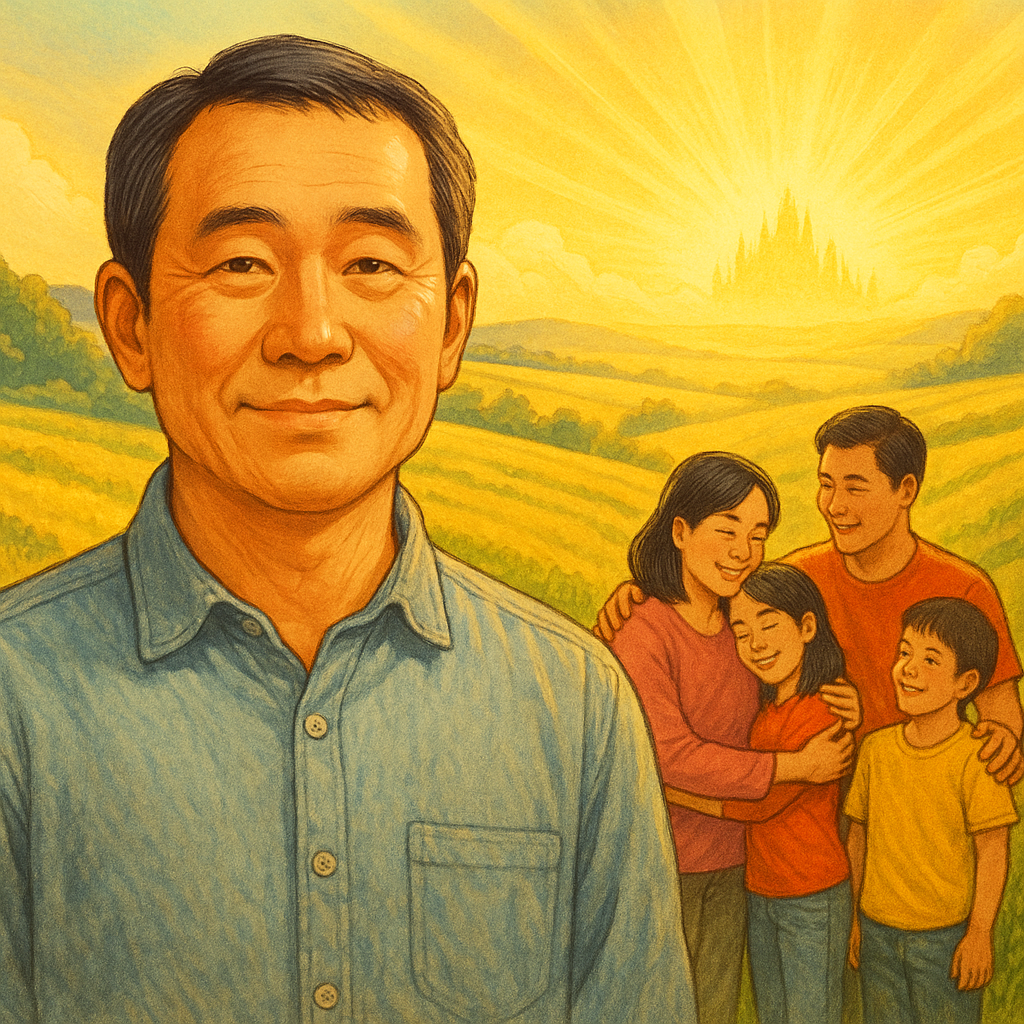文/HuSir
许多基督徒以为,只要信主、读经、祷告、参加聚会,死后便能进入天堂。然而,这样的理解恰恰是信仰与现实的严重脱节。天堂并非死后的安慰奖,而是活着时就应当被活出来的生命状态。若人在世时没有悔改、没有与神同行,即便口中称信,也依然活在地狱之中。
神的国就在你们心里:
耶稣从未教导人“等死后去天堂”,祂说:“神的国就在你们心里。”这意味着天堂不是未来的归宿,而是当下的同在。真正的信仰,不是等待一个来世的奖赏,而是在今生的每一天、每一个选择中,让真理成为生命的引导,让神的爱成为生活的现实。当人以真诚、悔改与爱去面对世界时,天堂就在此刻。
然而,许多信徒却活在形式化的信仰中。他们读经,却不让经文进入生活;祷告,却不敢把控诉与恐惧交给神;聚会,却不肯面对自己生命中的谎言与冷漠。久而久之,这样的信仰失去了力量,成了一个安慰良心的仪式。人看似敬虔,实则在属灵的昏睡中生活——这正是活着的地狱。
没有悔改的生命就没有更新。罪不是神施加的惩罚,而是人灵魂自造的枷锁。当人拒绝面对自己的罪、不愿改变、不肯宽恕、不敢坦露恐惧,他的心就与神隔绝。外表仍在信仰中行走,内里却在渐渐枯萎。那种内在的隔绝,不仅让人灵里窒息,也会慢慢侵蚀身体。
神的殿逐渐受损:
许多基督徒到了中老年,身体渐渐崩溃——高血压、心脏病、抑郁、焦虑层出不穷。医生能治症,却治不了心。那些从未面对的愧疚、嫉妒、伪装与惧怕,都在身体里留下了印记。灵魂长期的压抑,终将以疾病的方式显现出来。悔改被忽视得越久,病痛就越深。信仰若不能使人自由,教会再热闹,也无力医治。大洋国的很多人包括基督徒将人到中年的许多疾病归因于“肾虚”,但欧美国家的医学专家却一针见血的指出,“肾虚”并不是一个具体的身体器官器质性的病变,它实际上是一个人的精神世界受到长期压抑和损害导致的综合结果,从本质上讲便是本文所说的缺乏真实的信仰所致。
悔改的真义,并不是自责,而是回到神的光中,让真理照进阴影。当人开始悔改,他的灵魂便重新呼吸;当人学会交托,他的身体也随之松弛;当人重新信任神,他的生命重新获得温度。悔改让人看清自己,也重新看见神。那一刻,人不再惧怕死亡,因为他已开始真正地活。

赞美神即是赞美自由生命:
基督徒在日常生活中赞美神,不只是口中的颂歌,而是生命对真理的回应。赞美耶稣,也不只是宗教的仪式,而是人灵魂渴望自由的呼喊。真正的赞美,来自悔改之后的苏醒——当人不再活在惧怕与伪装中,而是在真理中自由呼吸。
许多人误以为“自由”是做自己想做的事,但圣经所说的自由,是不再被罪辖制,不再被恐惧驱动,不再被权力与谎言奴役。一个真正自由的人,是在光中行走的人,是在神的旨意中仍能安然微笑的人。
耶稣说:“真理必叫你们得以自由。”这自由不是逃避律法的放纵,而是灵里被释放后所拥有的平安与勇气。当一个人经历了悔改,他便不再以罪为羞,也不再以善为功;他只是单纯地在神的光中活着,用行动去赞美,用生活去见证。
因此,赞美神,就是赞美生命的真实;赞美耶稣,就是赞美灵魂被释放的时刻。
结语:
一个不再逃避、愿意面对、学会爱与宽恕的人,他便进入了天堂的氛围。
天堂不是远方,而是与神同在的此刻;
一个没有悔改的灵魂,即使身在教堂,也在地狱里;
一个悔改并与神同行的人,即便行走在尘世,也已在天堂。
Heaven Is Not After Death: The Reality of Faith, Body, and Repentance
By HuSir
Many Christians believe that as long as they have faith in the Lord, read the Bible, pray, and attend church, they will go to heaven after death. Yet this understanding reveals a deep disconnection between faith and reality. Heaven is not a reward granted after death; it is a state of life that should be lived out while one is still alive. If a person does not repent or walk with God in this life, even if they profess belief with their lips, they are still living in hell.
The Kingdom of God Is Within You
Jesus never taught people to “wait until death to enter heaven.” He said, “The kingdom of God is within you.” This means heaven is not a distant destination but a present reality. True faith is not about waiting for a future reward, but about letting truth guide every choice and letting divine love shape every moment of life. When one faces the world with sincerity, repentance, and love, heaven is already here.
Yet many believers live a formal, external faith. They read Scripture without letting it enter their lives; they pray but refuse to bring their fears and complaints to God; they attend church but never confront the lies or indifference within themselves. Over time, such faith loses its power and becomes a ritual that merely soothes the conscience. A person may appear devout, yet live in spiritual slumber — this is the hell of the living.
Without repentance, there can be no renewal. Sin is not God’s punishment but a chain the soul forges for itself. When people refuse to face their sins, resist change, or withhold forgiveness, their hearts grow distant from God. Outwardly, they may still walk in the faith, but inwardly they wither. This inner separation suffocates the spirit — and, eventually, the body.
The Temple of God Decaying Within
Many Christians, as they reach middle age or beyond, experience the collapse of their bodies — hypertension, heart disease, depression, anxiety. Doctors can treat symptoms but not the heart. The guilt, envy, pretense, and fear long buried within the soul leave deep marks on the body. The spirit’s repression eventually manifests as illness. The longer repentance is postponed, the deeper the sickness grows. A faith that does not bring freedom cannot heal, no matter how lively the church appears.
Many people in Oceania, including Christians, attribute many midlife ailments to “kidney deficiency” (shenxu) — yet Western medical experts point out that shenxu is not a true physical disease. It is a reflection of chronic psychological and emotional strain — the cumulative damage of a soul without true faith. In essence, it is what this article describes: the physical outcome of spiritual suffocation.
The essence of repentance is not self-condemnation but returning to the light of God and allowing truth to illuminate what was hidden. When a person begins to repent, the soul breathes again; when they learn to surrender, the body relaxes; when they trust God once more, life regains warmth. Repentance helps one see oneself clearly — and, through that clarity, to see God again. In that moment, fear of death dissolves, because one has finally begun to live.
To Praise God Is to Praise Freedom
In daily life, praising God is not merely singing hymns but the soul’s response to truth. Praising Jesus is not a religious performance but the heart’s cry for freedom. True praise arises from awakening after repentance — when one no longer hides in fear or pretense but breathes freely in truth.
Many mistake “freedom” for doing whatever one pleases, but the freedom of Scripture is freedom from sin’s bondage, from fear’s tyranny, from the slavery of power and falsehood. A truly free person walks in the light and smiles in peace, even amid the will of God.
Jesus said, “The truth will set you free.” This freedom is not lawless indulgence but the calm courage that comes when the spirit is released. When one has truly repented, they no longer hide in shame or boast in virtue. They simply live in the light of God — praising through action and testifying through life.
Conclusion
To praise God is to praise the truth of life; to praise Jesus is to praise the moment a soul is freed.
Heaven is not a faraway realm, but the very presence of God here and now.
One who no longer escapes, who dares to face, love, and forgive, already lives in heaven’s atmosphere.
A soul without repentance, even inside a church, lives in hell;
but one who repents and walks with God — even while still on earth — already dwells in heaven.

发表回复